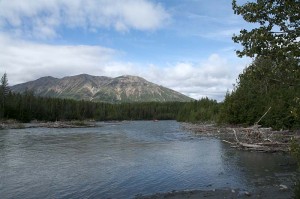Again we awoke to a very overcast day, with clouds hanging low over the mountains. It was very cool all day, but it didn’t rain. However, the wind is still very strong, and it is not really nice weather.
We weren’t sure we would be going hiking today, since it really looked like rain. Instead we drove south on the Haines Highway, and stopped at the tiny village of Klukshu, which is just outside the park. We hoped that we could see someone fishing there, but they are not. I spoke to a First Nations man who came to the river, and he told me it has been very dry here, with no rain for a month. I said, “it looks like it will rain today.”
He replied, “it looks like that every day, but it never rains.”
It is so dry that their spring from which they normally get their drinking water has dried up, and so they were taking water from the small Klukshu River. He said there were some salmon coming up the river, but that they weren’t fishing for them here, but, “there is a weir at Dalton Post, about 10 kilometres down the road, at the bottom of the big hill.”
We decided we would drive down to there, but had little luck finding it. Although there were several roads marked on the GPS which showed trails into Dalton Post, none of them existed. We continued on down the highway until we reached Million Dollar Falls campground. It would be a nice campground, but they have it posted for no tenting, we assume because of bears, which are now fishing for salmon in the rivers here. There was a well-constructed trail that went to several overlooks over the falls on the Takhanne River.
We drove on, looking for some road into Dalton Post, and it was obvious that there wasn’t one, so we turned around. As we drove back towards our campsite on Dezadeash Lake, we kept looking and saw a small road that was unsigned, leading to the west. It looked like it was in the right location, and we followed it. This road was marked on the GPS, though none of the other roads that intersect it exist. A few hundred metres down this trail is a large sign warning not to use it with large RV’s. The road was pretty rough, but since it hasn’t rained, it is ok. We drove to a large parking area, with lots of signs about fishing and bears, many bear proof garbage cans, and were really surprised to see the Yukon government worker there cleaning up toilets.
Enid saw something on the water, either canoes or rafts. We continued down the rough road to see if we could see what they were, crossed a small bridge, and saw the remains of some old cabins. A little farther on we came to another clearing, and there were two groups of people there. One was a commercial outfit from Alaska, getting ready to put their rafts into the river. They were watching another group of rafters (the ones Enid had seen upstream) who were having some difficulty finding the right channel in the river, got stuck, and had to wade their rafts off the small rapids in the shallows.
The other group of people were six young men from Switzerland. They had been hiking across the Yukon, and were now camped here at this spot. A group of their friends had been here a year or two ago, and had constructed a bake oven out of mud and rocks from the river. We spoke to one of the men, and he indicated that they had used the oven to bake a pizza yesterday, and that it worked quite well.
Totally by accident we have discovered where they start raft trips down the Tatshenshini River. We ate our lunch on the bank of the river, and watched as the commercial group got their gear together. Just as we were about to leave, another group of rafters showed up. From here to the Pacific Ocean is about 140 miles, and 650 metres drop in elevation, so the river must be pretty quick. The Tatshenshini is a famous rafting river, and also coincidentally the model name of the first good tent we ever owned.
The sun had come out by now, and so we decided to hike into St. Elias Lake. It is an easy hike, of eight kilometres, with just 120 m elevation gain. We hiked in and out in two hours to a very pretty lake surrounded by mountains. There is a campsite at the lake, though no one was camped there. All along the way we saw a great deal of grizzly bear scat, so Enid sang a lot, and I called out “Hello” loudly every time we came to blind corners, or spots where there was a lot of brush beside the trail. There was also old wolf scat on the trail, full of white fur, so it must have been there since winter.
Tonight it has gotten very cloudy again, the wind is strong, and it’s not very warm. Enid and I both have our toques on, and a pretty good fire going in the fire pit.

